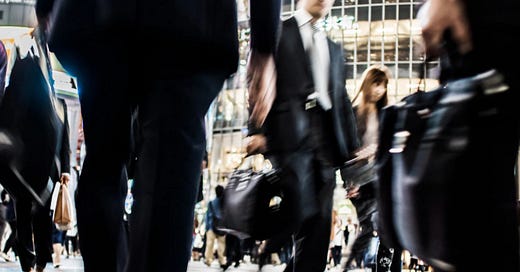Dear readers, how are you?
One growing issue in Japan in recent years is a type of street harassment commonly referred to as “butsukari ojisan”—literally, “shoulder-check men.” These are typically middle-aged or older men who intentionally bump into others while walking, often targeting women or younger people.
Surprisingly, it’s not just men—reports suggest there are also female perpetrators engaging in similar behavior. Though it might seem like an odd quirk or just someone being rude, deliberately bumping into others is legally considered assault in Japan and is a criminal offense.
If you encounter such a person, it’s best not to engage. Simply distance yourself and leave the area quickly and calmly.
When I Encountered a “Shoulder-Check Man”
It happened one day as I was walking down a sidewalk. Just ahead of me, a young man in his twenties was strolling along slowly while talking on the phone. From the opposite direction came a middle-aged man walking briskly and directly toward him.
I was positioned just after the young guy , and I noticed the older man make no effort to change direction. He deliberately slammed his shoulder into the young guy’s right side and continued walking as if to say, “Get out of my way.”
Startled by the atmosphere, I instinctively moved to the side and avoided contact. But the entire scene left a deep impression on me—especially the young guy's surprised expression as he quietly continued walking. This, I realized, might be what “everyday violence” looks like.
Other Common Examples
There are countless stories shared on social media about similar incidents:
Young women being frequently targeted
Mothers pushing strollers getting shoulder-checked
Middle-aged men barging through crowded rush-hour platforms
People being bumped into on nearly empty sidewalks
In some cases, habitual offenders have been caught on security cameras and reported to the police. But many victims stay silent, leading to increased concern that this is becoming a broader social issue.
The Social Roots of the Behavior
Why do so many of these incidents involve middle-aged or older men? Several contributing factors have been suggested:
An outdated, self-centered mindset rooted in age or gender hierarchies
Social isolation or stress from family or workplace dynamics
Feelings of resentment or jealousy toward younger people or women
A widening gap in social cohesion and empathy, especially post-COVID
Of course, not every man in this demographic behaves this way. But in many cases, these individuals appear to be taking out their frustrations on people they perceive as socially weaker. This reflects a broader decline in emotional resilience and mutual understanding in society.
What to Do If It Happens to You
Keep a physical distance: If you sense danger, trust your instincts and step aside.
Don’t engage: Confronting the person or filming them may escalate the situation.
Move to a safer location: In a train station, seek out staff or head into a convenience store.
Contact the police if necessary (call #110): Especially if you’re injured or feel threatened.
Nowadays, recording audio or video on your smartphone can serve as helpful evidence. While it may not always be necessary, having a way to document the incident is one more tool for self-protection.
The term “butsukari ojisan” might sound lighthearted or humorous at first, but in reality, it refers to a form of hidden street violence that causes fear, anxiety, and discomfort for many people.
Japan is renowned for its politeness and considerate culture, but like any society, it has its blind spots. For those considering living in or visiting Japan, being aware of these lesser-known social issues can help you navigate daily life more safely and mindfully.
Thank you,
Ryo (is working hard on my side raises at the gym:)




